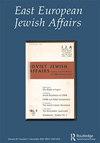In Conversation with Borya Penson
IF 0.2
4区 哲学
Q2 HISTORY
引用次数: 0
Abstract
In Kfar Hogla, Israel, a cute farmhouse sits on a beautiful piece of land. No fence. Maybe not even a lock. This is where my friend Borya built his home. And one can understand why: after his youth in the Soviet Union and nine years in a labor camp for having attempted to emigrate, he needs this peace and freedom; a feeling that the cheaper apartment in which he used to live in Haifa could not provide. Fifty years ago, Boris Penson participated in Operation Wedding, the attempt by a handful of Zionists from Riga to flee the USSR. They were sixteen who shared this dream and acted upon, eleven men and five women, including two non-Jews. After their failure, four women were released, one man was tried separately in a military court, and the others were indicted and tried 15–24 December 1970, in the “First Leningrad Trial.” All were found guilty. All did time in Soviet prisons/camps. Borya was sentenced to ten years, and served nine: in 1979 he was freed and relocated to Israel. To celebrate the fiftieth anniversary of East European Jewish Affairs (EEJA), the guesteditors, my friends Nick Underwood and David Shneer, who was also my advisor and editor-in-chief while I served as assistant-managing editor for EEJA, asked me to comment on Rene Beermann’s “The 1970–71 Soviet Trials of Zionists: Some legal aspects.” Beermann analyzed the legal frameworks of the First and Second Leningrad Trials, and of the Riga and Kishinev Trials. As a young scholar, I wondered how I could answer the editors’ call and contribute to the story without repeating what had been said time and again. I knew Borya through friends, so I reached out to him. He has been interviewed many times about the event. I wanted to ask him about what he feels has not been covered in those interviews. In response, Borya invited me to his home, this simple farmhouse he built with his wife (“slowly, after we bought the land, there was no money left!”), in a moshav fifty kilometers north of Tel Aviv. Our conversations were trilingual, mostly in Hebrew but with some English and Russian mixed in. The translations are mine. Borya was born in Tashkent, Uzbekistan, which was where his parents found shelter during World War II. At age four, his family returned to his mother’s hometown, Riga, Latvia. But, as he recalls, everywhere in the Soviet Union, it was populated by the same Homo Sovieticus as everywhere else in the country. I asked if this was what led him to become a Zionist. He replied: “I hated the regime. I couldn’t take the bullshit. Nothing is real, it’s impossible to get the truth. People don’t know the real history. And if you don’t know history...” He did not finish Edmond Burke’s quote. Borya studied at the Riga’s Academy of Arts and worked with painter Semion Gelberg. He knew that he would not be able to live in the USSR, though, he felt that he could not与Borya Penson对话
在以色列的Kfar Hogla,一座可爱的农舍坐落在一块美丽的土地上。没有栅栏。也许连锁都没有。这是我朋友博雅的家。人们可以理解为什么:他在苏联度过了青年时代,并因试图移民而在劳改营度过了9年,他需要这种和平与自由;这种感觉是他以前住在海法的便宜公寓无法提供的。五十年前,鲍里斯·彭森参加了婚礼行动,一小撮来自里加的犹太复国主义者试图逃离苏联。有十六个人,十一个男,五个女,其中有两个非犹太人,都作了这梦。失败后,四名妇女被释放,一名男子在军事法庭单独受审,其他人在1970年12月15日至24日的“第一次列宁格勒审判”中被起诉和审判。所有人都被判有罪。他们都在苏联的监狱/集中营里呆过。博利亚被判10年监禁,服刑9年。1979年,他被释放并移居以色列。为了庆祝东欧犹太人事务(EEJA)成立五十周年,我的来宾,我的朋友尼克安德伍德和大卫施奈尔,他也是我的顾问和主编,当我担任EEJA的助理执行编辑,请我评论勒内比尔曼的《1970-71苏联对犹太复国主义者的审判:一些法律方面》。Beermann分析了第一次和第二次列宁格勒审判,以及里加和基什涅夫审判的法律框架。作为一名年轻的学者,我想知道如何才能回应编辑的呼吁,在不重复他们一遍又一遍地说过的话的情况下为这篇文章做出贡献。我通过朋友认识了博亚,所以我联系了他。关于这件事,他接受了多次采访。我想问他,他觉得那些采访中没有涉及到什么。作为回应,Borya邀请我去他的家,这是他和妻子一起建造的简单农舍(“慢慢地,我们买了地之后,没钱了!”),在特拉维夫以北50公里的莫沙夫。我们的谈话是三种语言,主要是希伯来语,但也夹杂着一些英语和俄语。翻译是我的。Borya出生在乌兹别克斯坦的塔什干,他的父母在第二次世界大战期间在那里找到了避难所。四岁时,他的家人回到了他母亲的家乡拉脱维亚的里加。但是,正如他回忆的那样,在苏联的任何地方,都居住着和这个国家其他地方一样的苏维埃人。我问他,这是否是导致他成为犹太复国主义者的原因。他回答说:“我讨厌这个政权。我受不了这些废话。没有什么是真实的,不可能得到真相。人们不知道真实的历史。如果你不懂历史……”他没有把埃德蒙·伯克的话说完。Borya在里加艺术学院学习,并与画家Semion Gelberg一起工作。他知道他不能在苏联生活,尽管他觉得他不能
本文章由计算机程序翻译,如有差异,请以英文原文为准。
求助全文
约1分钟内获得全文
求助全文

 求助内容:
求助内容: 应助结果提醒方式:
应助结果提醒方式:


